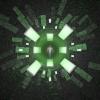As some may know, I am working on a game that involves a lot of scientific simulation to do what I consider to be -real- procedural generation. I am currently going through the different sciences in my blog, but having closed the book on my last version, I am now facing the move into far more detail on the 'science' part of things. And that is forcing me to study up on a lot of stuff!
I know how complex gravity systems work, and I have the theory for how to design a universe that unfolds from a fake Big Bang and then spreads out, gathers into stars and galaxies, and eventually has planets in it and so forth. However, I have very little experience in turning that into actual code. While I could just sit down and do a simulation of every bit of gravity pull and such, I can't help but wonder if someone has found easier (and less CPU intensive!) ways of doing it?? Right now, the plan is to have random "gravity centers" in a point cloud gather the contents of the universe around them as they all move outward and affect each other, but this will likely be by checking gravity pulling on every bit of content at the rate of one check per few miliseconds. It feels like there should be an easier way, maybe a set of (all things considered) simple equations that can pinpoint where everything is at a given point in time, or something like it. I honestly don't know, I have never gone into this much detail with my star / uuniverse simulations before.
So, does anyone know some good material on simulating star clusters pulling on each other as they go through space? Anything is appreciated, no idea should be tossed aside!
Edit: By popular request, an elaboration: I am not trying to accurately simulate our universe. I am making a game that I want to procedurally generate a universe according to realistic, by HIGHLY simplified scientific methods.












